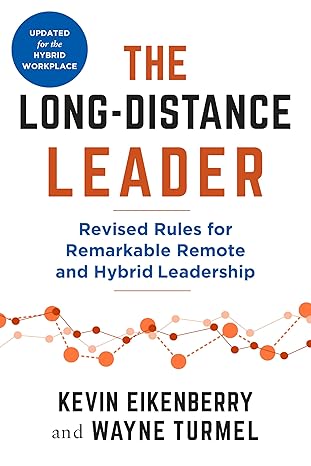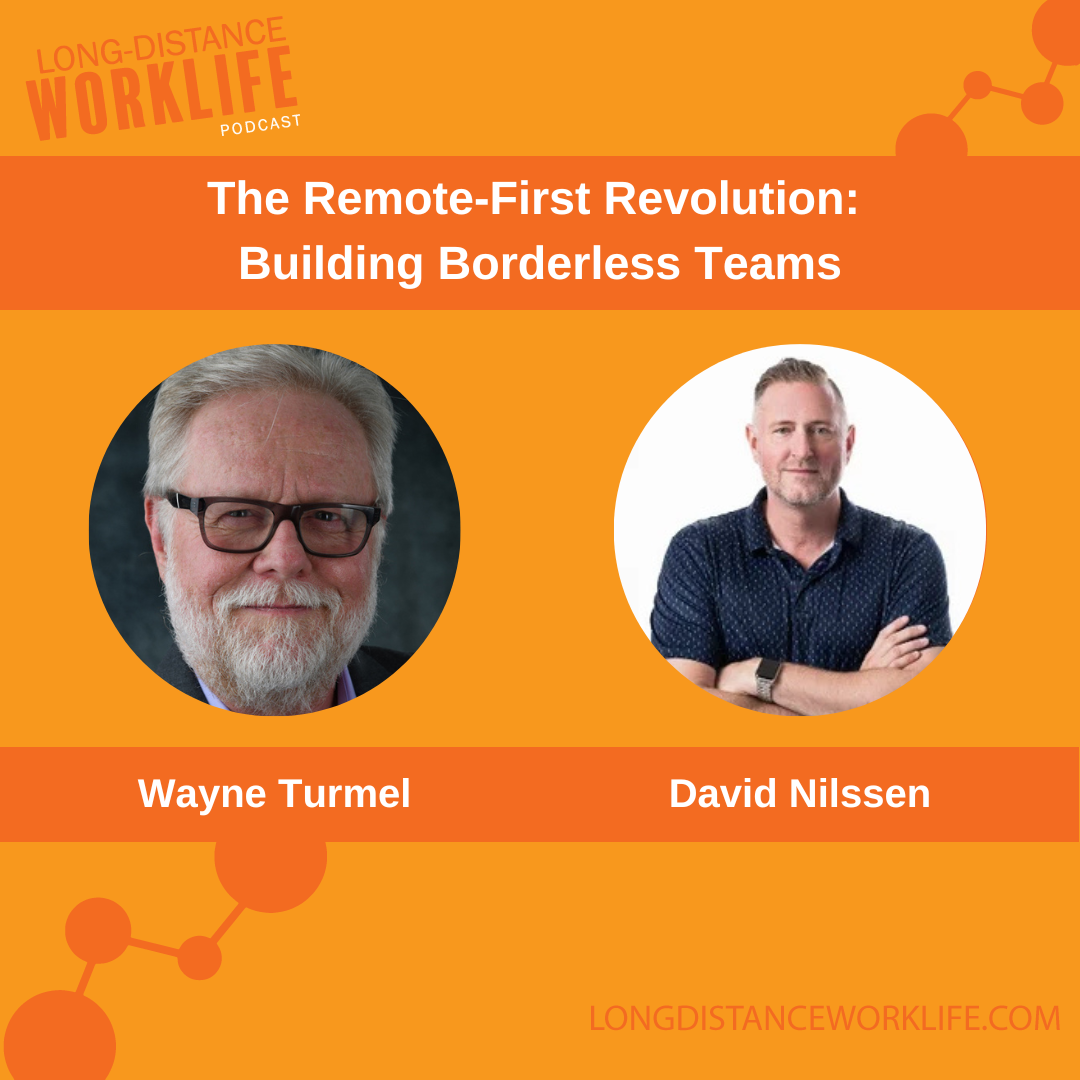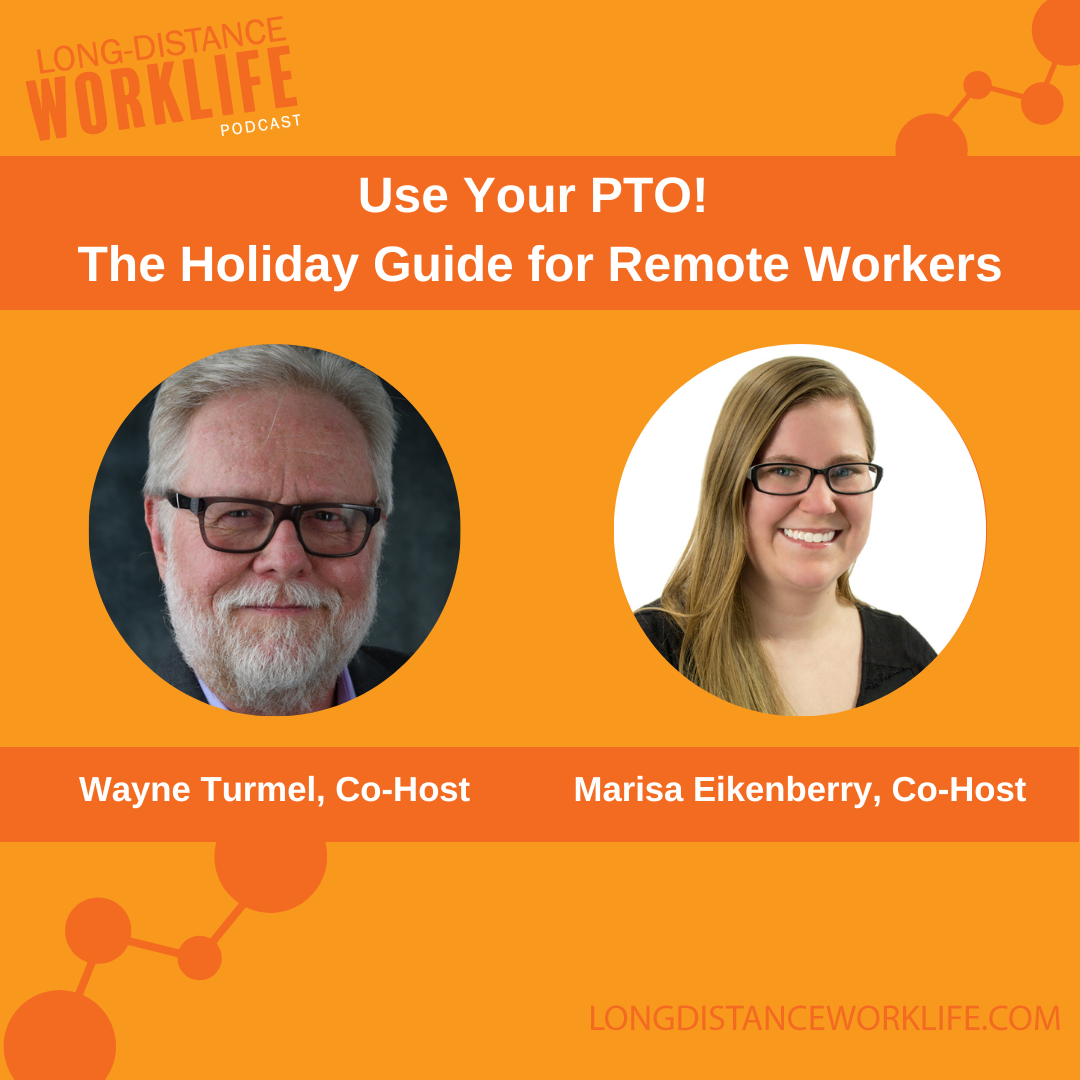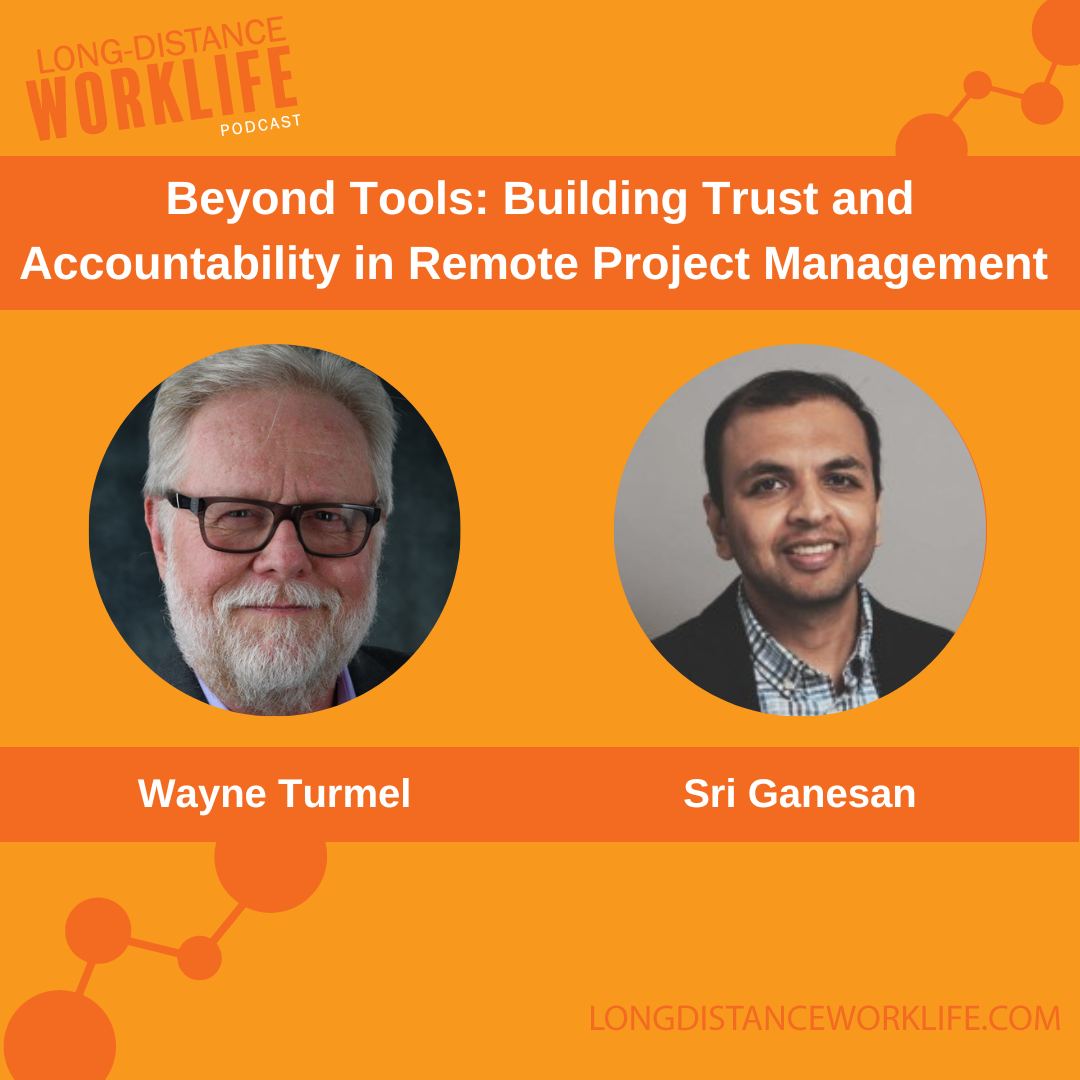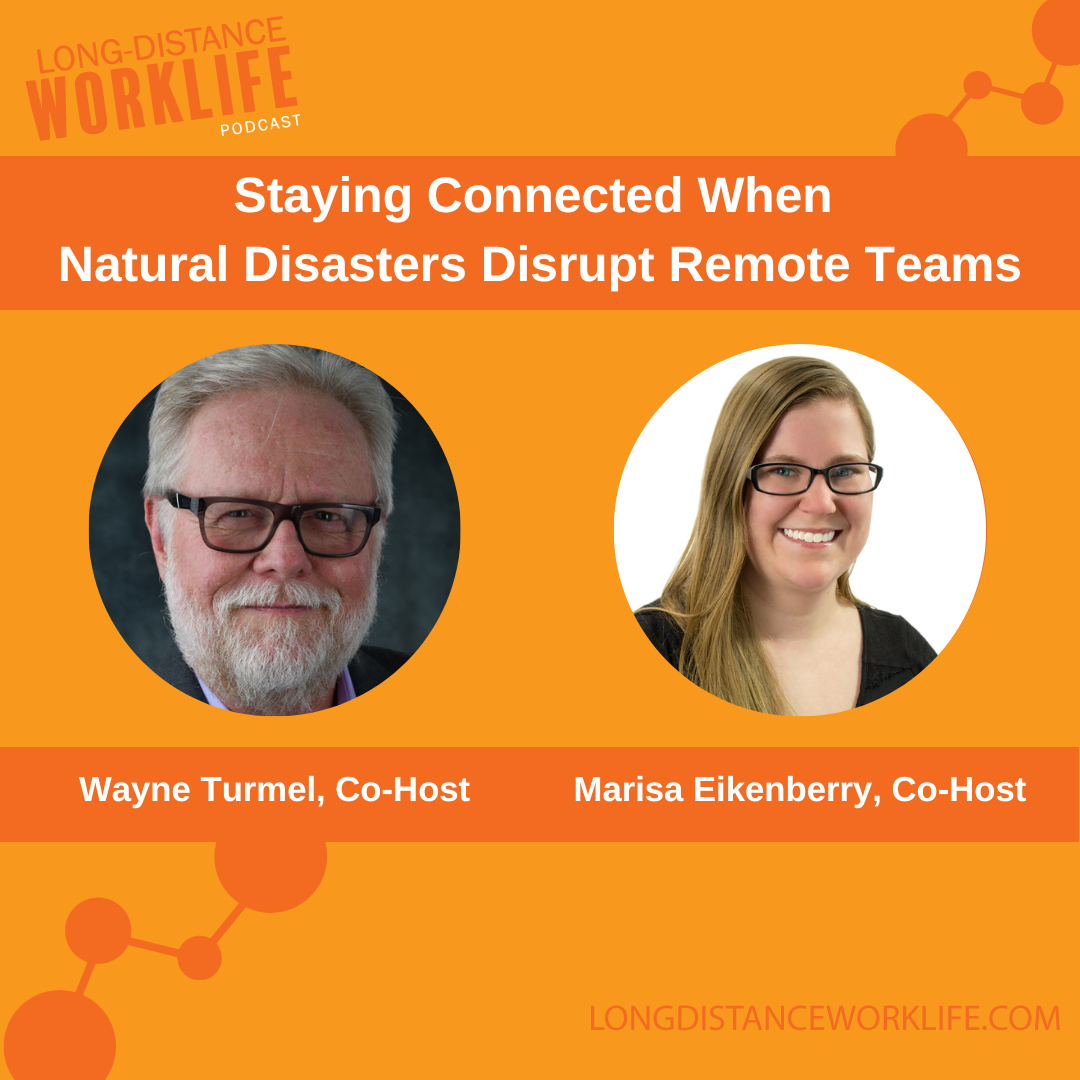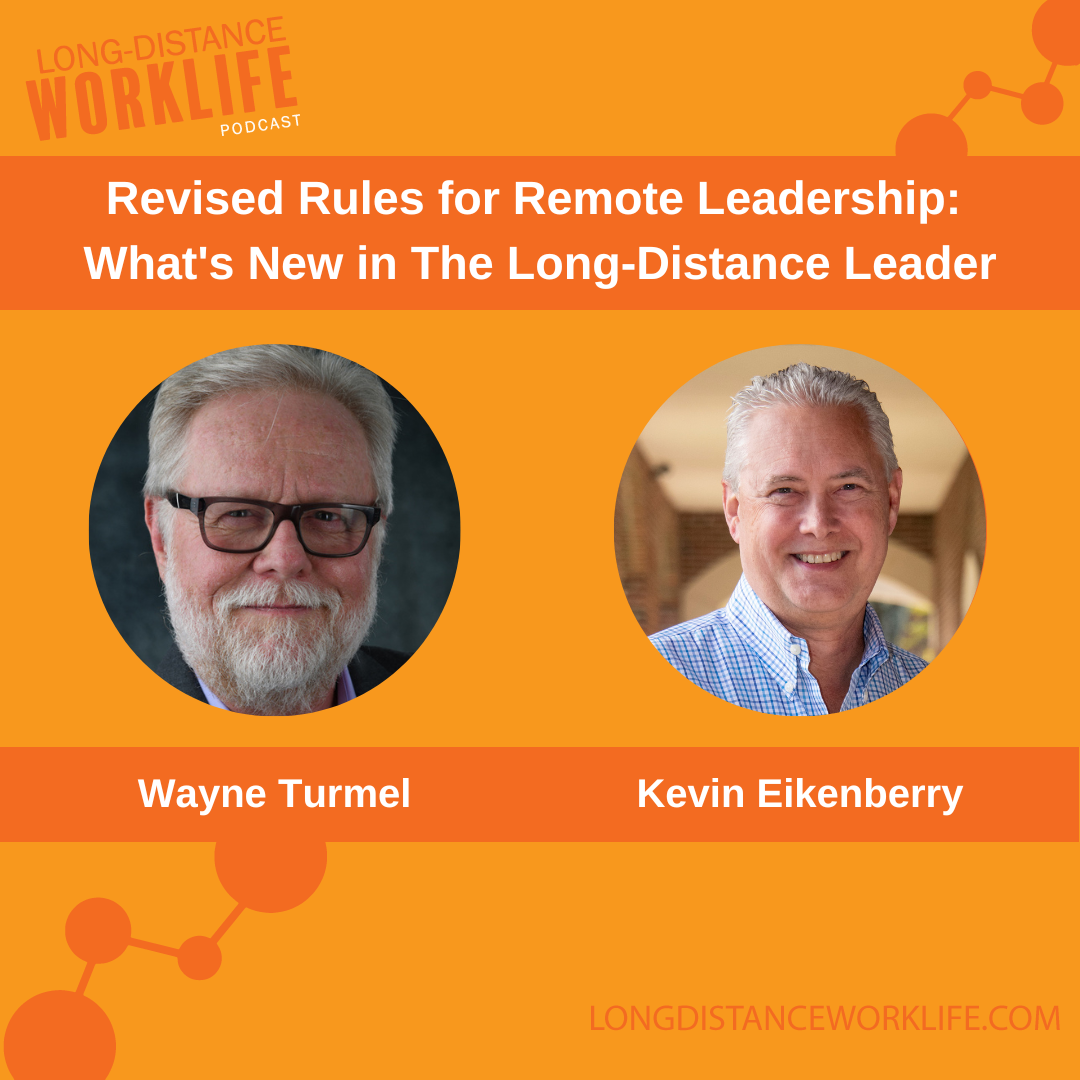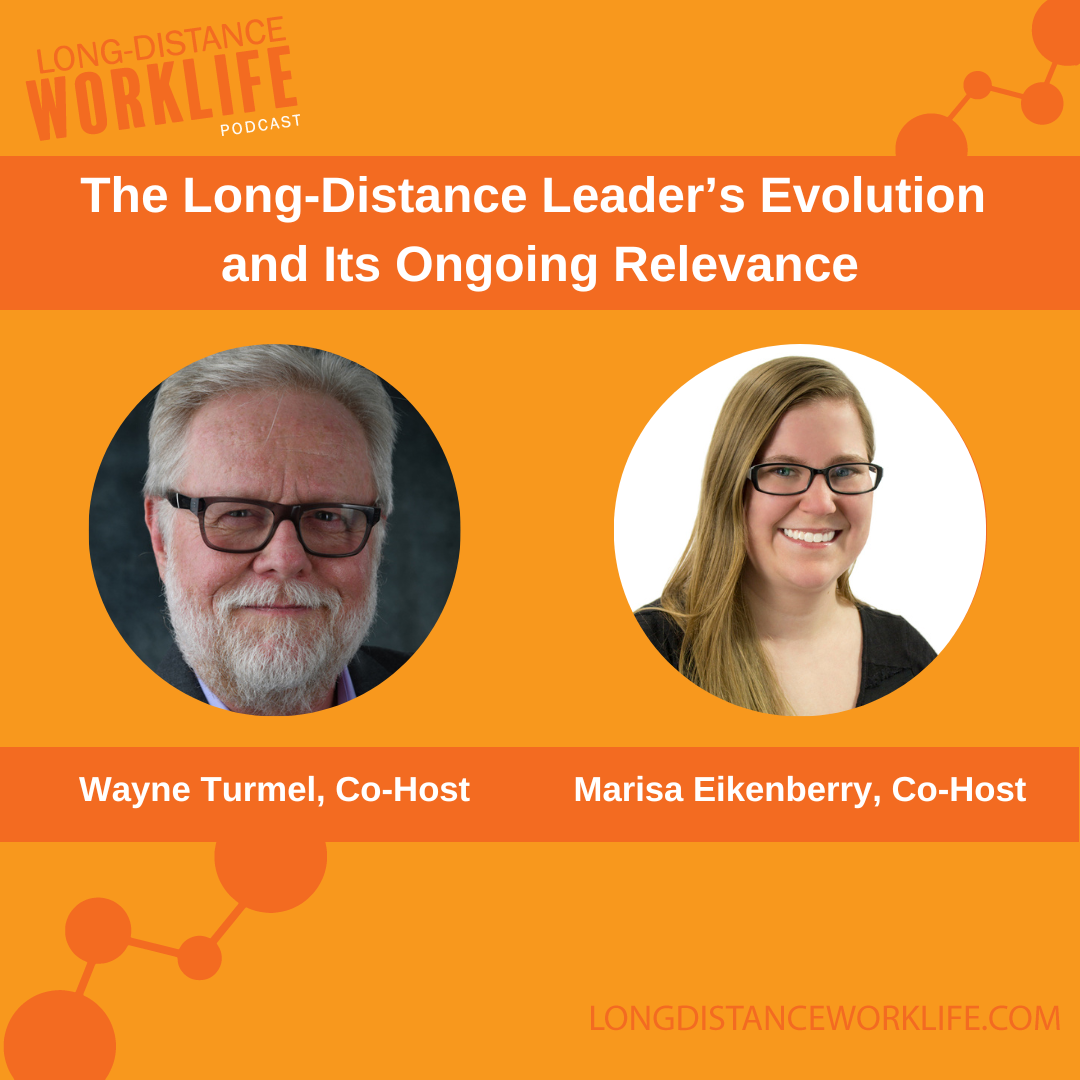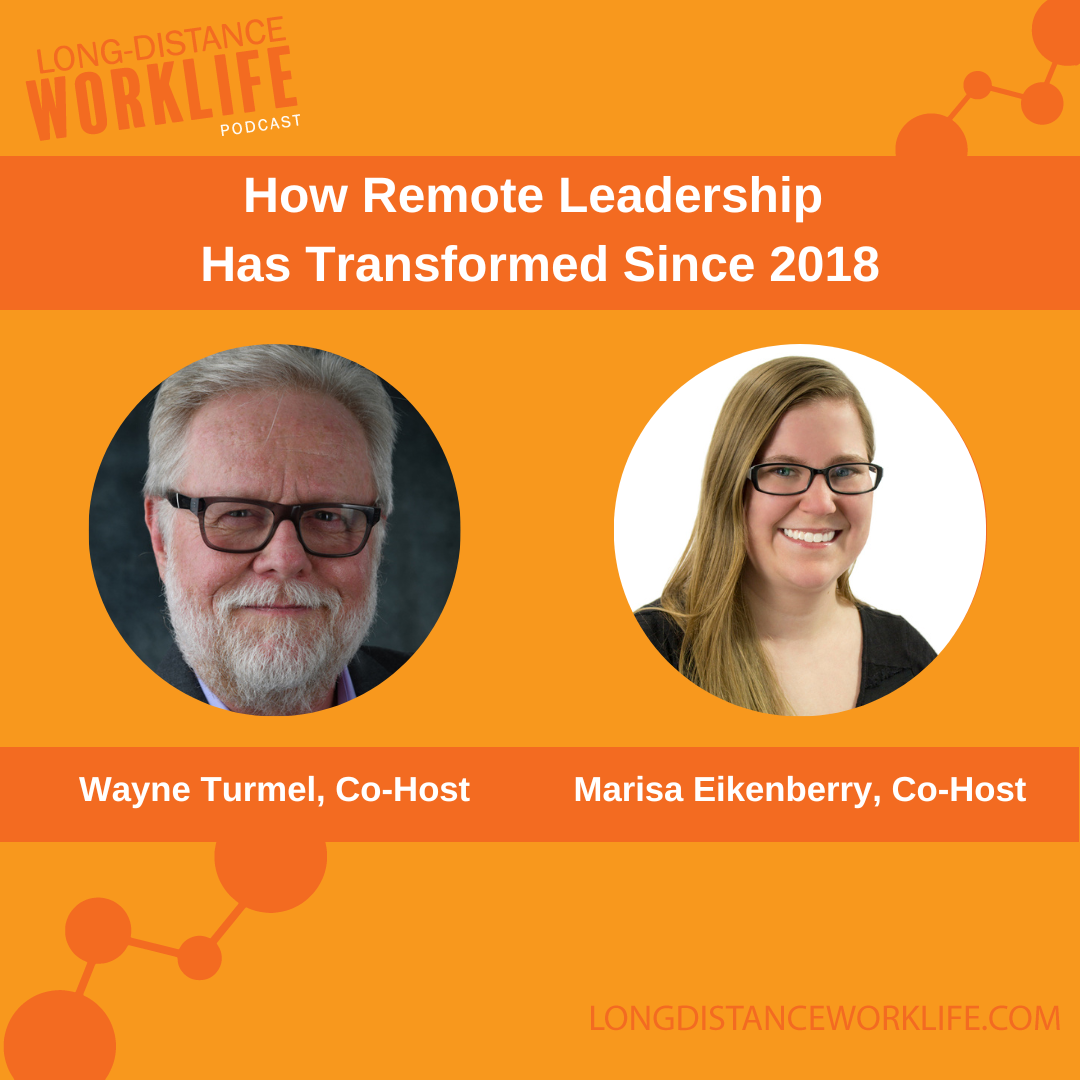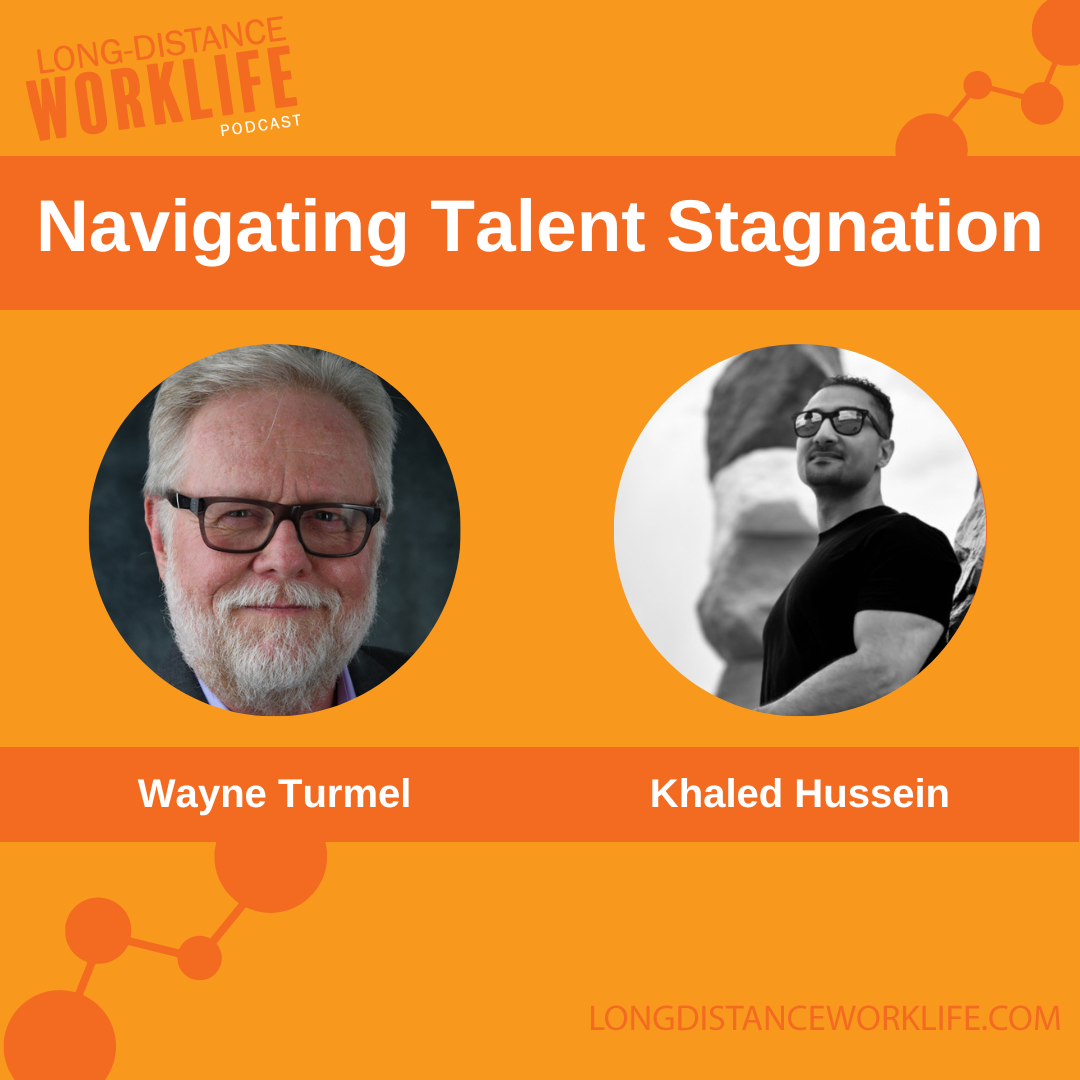In this episode of The Long-Distance Worklife Podcast, Wayne Turmel sits down with David Nilssen, author of The Future is Borderless and CEO of Doxa Talent. David discusses how his remote-first company manages over 1,000 employees across seven countries, completely office-free.
Explore the remote-first revolution, why hybrid work often falls short, and the importance of cultural awareness when managing borderless teams. David also shares lessons from his book and podcast, helping leaders navigate the challenges of global teamwork.
Key Takeaways
1.Remote-First Is a Strategic Choice, Not a Cost-Saving Measure: Embracing a remote-first approach isn’t about cutting costs by eliminating office space. Instead, it’s a deliberate strategy to align with modern workforce trends, investing in team-building, professional development, and collaboration.
2. Intentional Connection Is Critical in Remote Work: Without the "osmosis" of in-office interactions, leaders must intentionally create opportunities for team bonding, professional development, and cultural connection. This includes in-person meetups when possible to foster a sense of unity.
3. Cultural Awareness Builds Stronger Global Teams: Understanding cultural differences in communication, trust-building, and feedback is vital when managing international teams. For example, high-context cultures like the Philippines require indirect feedback, while low-context cultures like the U.S. prefer directness.
4. Hybrid Work Often Creates Two Classes of Employees: When hybrid environments are poorly managed, in-office employees may have better access to leaders, information, and opportunities, leaving remote workers at a disadvantage. Leaders must avoid this by ensuring equity in communication and collaboration.
5. Define Clear Roles and Outcomes for Outsourced Work: Outsourcing succeeds when organizations provide specific job roles and clear expectations. Avoid unrealistic “unicorn” job descriptions by focusing on the exact outcomes you need.
6. Training Remote Teams Requires More Than Osmosis: In-office training by osmosis—sitting a new hire next to an experienced employee—doesn’t translate to remote work. Leaders need structured onboarding processes and tools tailored for remote teams.
7. Outsourcing Can Benefit Higher-Level Roles: Outsourcing isn’t just for low-level administrative tasks. It can add significant value in higher-level functions like finance, marketing, and software development, especially when supported by robust systems and processes.
8. Start with Why: Before building an international or remote-first team, clarify your organization’s goals. Is it to build capacity, advance back-burner projects, or improve efficiency? Your purpose will shape how you approach the process.
00;00;08;05 - 00;00;39;27
Wayne Turmel
Hello, everybody. Welcome once again to the Long Distance Worklife Podcast, where we help you survive, thrive, arrive alive, whatever. In this crazy world of remote and hybrid and the evolving workplace. My name is Wayne Trammell. This is a Marissa Alice episode. Marissa will be back next week. But that means I get to talk to somebody really cool about an important topic.
00;00;39;27 - 00;01;02;01
Wayne Turmel
And so today we are going to talk about building international teams, working internationally, and probably ruffle a few feathers along the way, I suspect. My guest is appearing on screen now is David Nelson from Docs and Talent. He is in Boise, Idaho. Hi, David. How are you?
00;01;02;04 - 00;01;04;16
David Nilssen
I'm doing great, Wayne. Thanks for having me on today.
00;01;04;18 - 00;01;17;10
Wayne Turmel
Well, thank you for being here. Listen, the question is, who really quickly. Who are you? And docs and talent and what makes you qualified to talk about this?
00;01;17;12 - 00;01;40;15
David Nilssen
Yeah. So, docs a talent is a socially conscious outsourcing firm. We help, companies in the US build and scale up high performing teams of global talent. What makes me qualified to talk on this topic? We actually have about a thousand employees across seven different countries, and we have zero office space. So I'm a real, I'm passionate about remote work.
00;01;40;15 - 00;01;46;08
David Nilssen
I think it is the future. And I love talking about this with people. So glad to do it today.
00;01;46;11 - 00;02;06;14
Wayne Turmel
Now, before we started recording, we were having a conversation, and you said something interesting, which strikes me as, a little paradoxical, which is that you have no office space. But you told me before that you are remote first.
00;02;06;17 - 00;02;07;29
David Nilssen
Yes.
00;02;08;02 - 00;02;12;28
Wayne Turmel
You had. How do you swear that? How do you make that work with this many people?
00;02;13;00 - 00;02;29;28
David Nilssen
Yeah, I think a lot of people have this assumption that the reason why companies go remote is to save money on office space, and. And the reality is, what I tell people is that when we chose to go fully remote, meaning no office space whatsoever, we weren't remote, only we were remote first. It's not a cost cutting exercise.
00;02;29;28 - 00;03;04;19
David Nilssen
It's just a strategic move to embrace what we think are modern workforce trends. And so for us, when we say remote company, it does not mean that we don't ever get together, as an organization. So, for example, next week, my entire leadership team, and other members are flying into Manila and we're going to have, a week long, event where we do some cultural training, where we do some strategic training, we unveil our annual plan, we do some teambuilding, and then we have our annual holiday celebration, and we'll have approximately 700 people ascend on Manila for us to be able to have that.
00;03;04;19 - 00;03;10;06
David Nilssen
So that's obviously a pretty large expense. We're not saving money, we're just investing it in different ways.
00;03;10;08 - 00;03;28;13
Wayne Turmel
And that's really important. I, I think this is a little sidetracked, but I think it's important, this notion that people look at remote as a way to save money and therefore investing in getting people together is something we don't need to do because we're remote.
00;03;28;15 - 00;03;49;28
David Nilssen
Yeah, I don't think that's actually true. I mean, I do believe that in an office you have this great opportunity to build relationships, but you generally do it unintentionally through osmosis, right? You and I meet at the water cooler. We have a little coffee together. Or we have these crazy events. And I remember, you know, a decade ago when I had everybody in one office in downtown Seattle, we had all these fun events that we would do.
00;03;49;28 - 00;04;09;19
David Nilssen
And it's really about creating a fun environment when you move to the remote world now, also, you don't get a chance to sort of build that connective tissue that you would just build, naturally through, being in an office and so we have to sort of create those opportunities in small, digestible snippets. And so that's what we are we're doing in that regard with the group.
00;04;09;25 - 00;04;23;09
David Nilssen
The other thing I would say, though, is that also, instead of investing what I would call fun, and that's what people often think of culture as we're investing more in professional development and tools and training resources to help elevate them as people, professionals, along the way.
00;04;23;12 - 00;04;35;20
Wayne Turmel
What kind of skills when you are putting a team that is going to be remote first and more than that, international, what kind of skills are you looking for?
00;04;35;22 - 00;05;02;18
David Nilssen
Well, in our in our company, we help companies. We help our clients. I say build teams of everything from, administrative professionals to finance and accounting, data science, software engineering. So the skill set that they need, will vary depending on the type of roles that our clients need them to play. But I would say aside from that, there are some characteristics of the way people work in this sort of, internal needs that they have that are important.
00;05;02;18 - 00;05;19;14
David Nilssen
So we actually use an assessment to help us as one indicator towards predicting whether this person can be successful in a remote environment. One is have they done before? And if they haven't. And we want to understand are these people autonomous workers or do they need a lot of direction and sort of support, or are they social people?
00;05;19;20 - 00;05;48;25
David Nilssen
Because if you have a very high social need, the remote world can actually feel very isolated. For someone who's really a high producing individual, doesn't need a lot of social stimulus, though it can actually be a very freeing environment. And then the other thing that I would say that we do is we spend a lot of time, working with our clients to make sure that they have the right process and systems and collaboration tools and rhythms to get the the outcomes that they want from the workers that we have, because we could provide the best worker in the world.
00;05;48;27 - 00;05;56;19
David Nilssen
But if the company is instead of to actually support a remote worker or an international team member, then it may not be successful. Anyways.
00;05;56;22 - 00;06;01;05
Wayne Turmel
What kind of pushback do you get? What don't they expect they're going to have to do?
00;06;01;08 - 00;06;02;26
David Nilssen
The workers with the clients?
00;06;02;28 - 00;06;12;05
Wayne Turmel
The clients? I'm not. The person with the money makes these decisions in the long run, and are largely responsible for whether it works or not, right?
00;06;12;08 - 00;06;30;21
David Nilssen
Yeah. The thing that's always the most surprising and the place where people are challenged, the greatest working with remote workers, whether they're offshore, onshore, it doesn't really matter. The question is, do they have the tools and the sort of rhythms to work with people in our environment? Oftentimes we default in office practices when we have in office workers.
00;06;30;21 - 00;06;50;11
David Nilssen
And so we haven't built the the sort of muscles that we need as leaders to make sure that people are clear on the outcomes that are expected of them to, ensure that they've put the right person in the right seat and that, everyone feels like they're on the same playing field. So that would be the first one, is do they understand how to work with the remote, workforce?
00;06;50;13 - 00;07;09;15
David Nilssen
The second, though, is do they have standard operating procedures for the roles that are, you know, required for people to do similar work constantly, which is often what gets outsourced. They need to have standard operating procedures. Well, it's pretty interesting to me, as I've worked with large scale organizations up to public companies who didn't really have strong SOPs.
00;07;09;15 - 00;07;16;26
David Nilssen
And so that tends to be the place where there's the biggest friction point when you're trying to blend international remote with standard work.
00;07;17;03 - 00;07;42;10
Wayne Turmel
Yeah, the notion of this is how we want you to do it. As you say, it happens a fair amount by osmosis. When you're in the office, it's kind of in the oxygen. There that you breathe, which also leads to something else, which is you are very definitely remote first, and you're not a big fan of hybrid work, or at least what a lot of people call hybrid work.
00;07;42;13 - 00;07;47;08
Wayne Turmel
Now, here's your chance there. Here's your soapbox, buddy. Have.
00;07;47;09 - 00;08;10;25
David Nilssen
Yeah, yeah, yeah. Well, I mean, look, I would say, my first experience. So pre-pandemic, we were sort of playing with should we go remote? We've been a centralized organization for almost two decades. And, the company that I was running at the time and, you know, we celebrated culture, but we were starting to get the, you know, people reaching out to saying, hey, I'm having to move further to a for a home.
00;08;10;25 - 00;08;29;21
David Nilssen
I want to work here. I love the company, but I can't can't commute two hours a day. Would you be open to this? And so we started playing with that. And we constantly heard little grumblings from our team. That was just a bad experience. Well, it became, true to me when I was traveling on the road, we were having a leadership team meeting, and everyone sitting around the table.
00;08;29;23 - 00;08;50;25
David Nilssen
And here I am sitting in cyberspace on a zoom call. They kept forgetting about me. I was I wasn't able to barge into the calls. I couldn't read the body language of the people around me. And I realized really quickly that by creating a hybrid environment, we created two classes of people. Those that had access to information, access to leaders could read the body language and those that did not.
00;08;50;28 - 00;09;09;09
David Nilssen
And so when we looked at it, we zoomed out, we said, hey, look, in an office, we built all the same sort of muscles around. How do we how do we think about productivity and employee experience and what management, skills and tools do you need, and how do we train people and the same thing is true in remote.
00;09;09;09 - 00;09;25;20
David Nilssen
If you're fully remote, you build the same sort of muscles. When you're in a hybrid environment, you have to do both. So you do both and you pay for both. But you can't really be best in class either. And so for us, we decided we wanted to be a remote organization. We felt like that was the future of the modern workforce.
00;09;25;23 - 00;09;34;10
David Nilssen
But I'm not against in-office work. I just believe that in the hybrid environment, it's the most expensive and potentially the most dangerous for employee experience.
00;09;34;13 - 00;09;50;22
Wayne Turmel
There you go. Now, some of that, of course, has to do with what we think of as hybrid. And are we aware of these dynamics and taking steps to deal with them? Right. Well, where I'm in violent agreement is when it's done badly, all of those things.
00;09;50;24 - 00;10;06;26
David Nilssen
Yeah. Okay. Well, you talked about training just a second ago when you brought that up. I thought, you know, that's a great example of one. Right. So when we used to have salespeople that would onboard with us in an office, I would say, hey, Wayne, welcome to the company. And I'm over generalizing, of course, just to be illustrative here, but hey, great to have you here.
00;10;06;26 - 00;10;19;20
David Nilssen
You're to be our orientation with our HR leader. And then I'm going to have you sit next to Dave. Dave's been in this role for two years. You're going to watch him for the next 2 to 4 weeks. You'll pick it up, you'll be great. And that's sort of how people think about training. It's really training by osmosis.
00;10;19;22 - 00;10;38;21
David Nilssen
But in a remote environment that is absolutely impossible. So if your company is set up to onboard and train and develop people in a, in an in office environment that is not aware of or sensitive to the remote workforce, then the remote people get the short end of the stick and oftentimes, are much less successful.
00;10;38;23 - 00;11;06;08
Wayne Turmel
Absolutely. So we're going to put a pin in that for the moment. Let's get back to the notion of building an international team. If you're remote first and probably on some levels shouldn't matter. In the job and you have the infrastructure, it'll work. I suspect human beings don't work quite that easily. What are some of the challenges when you're putting together an international?
00;11;06;11 - 00;11;26;29
David Nilssen
Yeah, so there's a couple of things. One is, most people are actually not terribly clear on what sort of outcomes and activities are required of the people. So I can't tell you how many times I get sent a job description. And it looks like somebody took a, an executive assistant, a finance, professional and a software engineer and just sort of merged them together and said, hey, we're looking for this unicorn.
00;11;27;02 - 00;11;40;28
David Nilssen
And I think when a company is thinking about outsourcing, be very clear about the specific skill set, and outcomes are looking from a particular role. I know that sounds like table stakes, but, it is not. The second thing that I would say is that most people don't realize that.
00;11;40;28 - 00;11;50;03
Wayne Turmel
There's nothing there is nothing natural. There is nothing natural or simple about doing things naturally and simply.
00;11;50;06 - 00;12;11;23
David Nilssen
Yeah. Totally true. The second thing we've already covered, which I won't go into, it's just it's the management side of this. I find that most of the time when offshore teams fail, they either have the wrong provider, which is possible, or the management team is not really equipped to deal with both remote or international talent. The remote side we will talk about because we did just a minute ago.
00;12;11;25 - 00;12;30;13
David Nilssen
But when it comes to remote workforce right now, two really hot destinations, both of which we serve, are the Philippines and Colombia. And when you think about how do we communicate, how do we evaluate, problems with an organization, how do we lead? How do we make decisions? How do we build trust? How do we disagree?
00;12;30;13 - 00;12;49;24
David Nilssen
Those are all very different based on the cultures you're in. So I'll give you a couple of examples. One is, how we communicate. So, you know, in the Philippines, they've been a country, living on these islands for thousands of years. They've learned how to communicate through cultural nuances and very sophisticated level communication. Well, there you go.
00;12;49;24 - 00;13;12;10
David Nilssen
To us. We've been around for 250 years. We're a, a country of immigrants. We have to be very explicit what they call low context. And the way that we communicate Philippines high context, U.S. low context. So oftentimes the Filipinos to the Americans can feel avoidant in a conversation when in fact, actually the way that they communicate is just very, very different.
00;13;12;12 - 00;13;34;18
David Nilssen
The other thing is how we build trust. So here I'm very task based, which is very U.S centric, very in the way that I built trust. When you told me you were going to do X, you did it on time and you did it well, I now trust you to do the next step in the Philippines. Well, they want to have long coffees and lunches and get to know you as a human being and those kind of things before they trust you.
00;13;34;18 - 00;13;59;05
David Nilssen
And so understanding some of those nuances, they're not wrong. They're just different. But I think a lot of times we expect everyone to be very American in the way they work, when in fact we also need to be open to and embracing, the cultural nuances the others. So one example of that would be, when it comes to giving feedback, in the US, we like more direct feedback, not quite like the Germans, but we like more direct feedback.
00;13;59;11 - 00;14;14;01
David Nilssen
And then in the Philippines, indirect negative feedback is how you give it. So you have to sort of sandwich, the feedback one positive, a negative and then another positive. In order for them to be able to hear and understand it. So there's just things like that that make a big difference.
00;14;14;04 - 00;14;42;28
Wayne Turmel
I'm curious. And maybe this is my Canadian American centric brain. It seems to me markets like the Philippines. And this has to do with colonialism and all kinds of things, probably function with Americans a little bit, probably better, but certainly different than a country like Colombia, which is unifying you all, which you know, is there challenges there?
00;14;43;01 - 00;15;06;05
David Nilssen
Well, surprisingly, the Colombian culture is actually, closer aligned to the American culture in terms of the business environment, the Filipinos. Yes, I would say from a the standpoint of it is primarily an English speaking country. To your point, at one point, American said had, certainly occupied the territory. There's a great alliance from a government standpoint.
00;15;06;05 - 00;15;26;12
David Nilssen
There's a tax treaty. There's a lot of reasons why you would think that. But, they are still very, you know, hierarchical in terms of the way that they operate. Then it's got to be very prescriptive in terms of what's expected of them. And so, just a little bit different, though, in terms of the business environment, they've not quite yet adapted as a full culture in that way.
00;15;26;13 - 00;15;38;09
David Nilssen
Obviously, there's some people have been working with, American business for a long time. That's not an issue. But in general, what I've seen is actually the Colombian culture is a little bit further towards, or closer aligned to the American way of doing business.
00;15;38;11 - 00;15;56;14
Wayne Turmel
Well that's fascinating. And I could geek out on this for a very, very long time. When you go into these markets and looking for talent, are you looking for locals? Are you looking for expats who happen to be living there?
00;15;56;18 - 00;16;17;21
David Nilssen
No, actually, the I'm in fact, I would I would venture to say I'm not aware of any expats that work for us. These are all, local, individuals who who want to work with and learn from, American companies. And so, you know, a lot of the skill sets are the same when it comes to design and, email marketing and finance and accounting.
00;16;17;21 - 00;16;44;20
David Nilssen
A lot of those standard principles are the same. So it actually translates very, very well. But the things that we look at when we go to these markets is, is there, you know, safety, currency stability, is there the right infrastructure? Both. We look at, you know, the the possibility of, natural disasters, all these sort of things that we look at to say, hey, is business continuity going to be an issue for us for one reason in these particular areas?
00;16;44;20 - 00;16;48;15
David Nilssen
And so that's one of the things that we look at in addition to time zone and talent density and things like that.
00;16;48;16 - 00;17;14;07
Wayne Turmel
Very, very cool. We are nearing the end of our time already, which is amazing to me. If you are advising somebody to put together an international team that's going to be remote first, that you know it's going to do this, what are the 1 or 2 very first things that they need to do in your mind to be successful?
00;17;14;10 - 00;17;40;08
David Nilssen
Yeah. I would say first I would look at the places in my organization where I need to add excess capacity, but doing their fiscally responsible way, or where we have people who could be adding even greater value to the organization doing, work that that could be potentially moved somewhere else. Standard work. That, could be moved someone else so that they can focus their time and energy on higher value out of test.
00;17;40;08 - 00;17;54;17
David Nilssen
So that would be the first thing that I would look at. The second thing is I would look at is, what are some of the things that are on the back burner that have been your perpetual second or third priority that you know, need to get done, but you just haven't yet had the time, energy, or capacity to address?
00;17;54;24 - 00;18;05;00
David Nilssen
Those are the first two things that I would look at. And then downstream are the things that we talked about, which is making sure you got the right standard operating procedures and the tools and resources to be able to help to collaborate with those individuals.
00;18;05;02 - 00;18;16;29
Wayne Turmel
But deciding why you want to do it, and that this is a good business thing to do, is probably a good first step. And you'd think that would be a natural thing for people.
00;18;17;02 - 00;18;41;14
David Nilssen
Absolutely. You would think so. But I think a lot of people still just believe that outsourcing is really for, you know, low level tasks. Outsourcing can actually add value in every part of the organization. And my expense I've seen the further we move up in New York chart, the more value we extract from that experience. And so I would not limit yourself to just thinking about administrative work, more about where are the parts of organization that you want to advance, faster than you are today?
00;18;41;20 - 00;19;05;15
Wayne Turmel
Absolutely. David, thank you so much for being with us. Ladies and gentlemen, we will have links to David to, to the future is Borderless podcast Host, which is his podcast. We will have that on our show notes at Long distance Work life.com. David, I'm going to dismiss you and I am going to wrap up the show here.
00;19;05;19 - 00;19;08;00
Wayne Turmel
Thank you so much for being with us, man.
00;19;08;02 - 00;19;08;29
David Nilssen
Thanks for having me.
00;19;09;01 - 00;19;41;09
Wayne Turmel
And now, ladies and gentlemen, boys and girls. Well, come back, long distance work life is based on the books. The long distance leader, long distance teammate, and long distance team. If you want information on our new book, long distance leader, revise rules for remarkable remote and hybrid leadership. This is the new, updated edition. It is available at long distance work life.com/ldl.
00;19;41;09 - 00;20;08;09
Wayne Turmel
There are special deals and all kinds of extras that you can get there. If in fact, you are interested in our training on this, we have the long distance leadership series, which is coming up very quickly, a virtual open enrollment class. We would love to have you check that out. Visit it. Kevin eikenberry.com if you enjoyed today's show.
00;20;08;09 - 00;20;33;03
Wayne Turmel
And I certainly enjoyed my conversation with David. It's a podcast. You know how this works. Like and subscribe and tell your friends so that others can find us. That is really about it. If you have a question, a comment, a vicious personal attack, an idea for a guest that you want to tell Marissa and I about, contact us through our LinkedIn page.
00;20;33;08 - 00;20;55;27
Wayne Turmel
Or you can just simply, email us, Wayne and Kevin Eikenberry, Marissa, Kevin eikenberry.com and join us there. Thank you so much. Marissa will be with us in our next show for now. Thank you for being with us. Keep your head above water. Don't let the weasels get you down and we will see you next time. Hey!
Timestamps
00:00 Introduction
00:39 Meet David Nilssen and Doxa Talent
02:10 What It Means to Be a Remote-First Company
03:10 Building Culture Without an Office
05:02 Skills Needed for Remote-First International Teams
07:16 Why Hybrid Work Often Fails
10:38 Training and Onboarding in a Remote Environment
11:06 Challenges of Building International Teams
14:14 Cultural Nuances in Global Workplaces
17:00 Advice for Building Remote-First Global Teams
18:41 Closing Thoughts and Resources
Related Episodes
Additional Resources
- Follow David Nilssen on LinkedIn
- Follow Doxa Talent on LinkedIn
- Learn more about Wayne Turmel
- Email Wayne Turmel
- Connect with Wayne Turmel on LinkedIn
- Learn more about Marisa Eikenberry
- Email Marisa Eikenberry
- Connect with Marisa Eikenberry on LinkedIn
- Purchase a copy of The Long-Distance Leader
- Purchase a copy of The Long-Distance Teammate
- Purchase a copy of The Long-Distance Team
- The Kevin Eikenberry Group
Order The Long-Distance Leader
Perfect your remote leadership skills with the updated edition of "The Long-Distance Leader" by Kevin Eikenberry and Wayne Turmel, featuring new principles and proven strategies for today's hybrid work environments.
